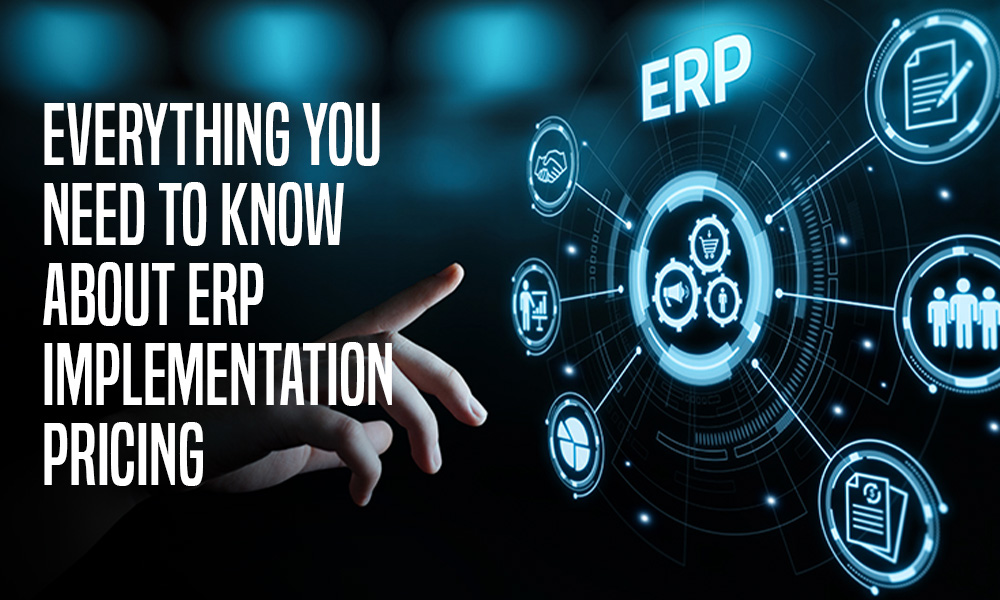ERP systems have become crucial tools for streamlining business operations and enhancing the efficiency of the organization. However, companies often face complexity while making decisions regarding ERP implementation. One of the main factors to consider is the cost of the ERP system.
In this blog post, explore ERP implementation pricing, including the factors that influence it, how to estimate it, and the benefits of partnering with SourcePro.
How Much Does an ERP System Cost?
If you are looking for ERP system implementation for the first time or ERP software modification, the cost varies based on the requirements and scale of your company.
Some of the key factors that influence ERP software pricing include:
- The size and complexity of your organization
- The number of users
- The level of customization required, ongoing maintenance and support costs
- The add-ons
- The ERP vendor you choose
It is essential to carefully consider these factors and estimate pricing accurately to align with your business goals. Partnering with SourcePro can provide expertise, streamlined processes, cost-effective solutions, and industry knowledge to ensure a successful ERP implementation.
Which Are Standard Modules Included in A Base ERP System?
A base ERP system includes some standard modules essential for functions across various areas of business operations, where specific modules vary depending on the industry, organizations’ requirements, and vendor offerings. Some common ones include:
Financial Management/Accounting
This module functions to handle tasks such as,
- Balancing general ledgers
- Maintaining accounts receivable and payables
- Reconciling transactions and bank accounts
- Performing real-time reporting
Implementing this module makes operations centralized and improves task automation.
Human Resource Management
An ERP investment in the HRM module has numerous benefits for human resource management.
It saves time by automating repetitive tasks such as,
- Employee data management,
- Payroll processing,
- Employee benefits,
- Leave management and much more.
Additionally, it provides real-time access to employee information, enables efficient recruitment and onboarding processes, and facilitates performance management and training programs.
With the HRM module of ERP software, organizations can streamline their HR processes, improve productivity, and enhance employee satisfaction.
Inventory Management
An ERP implementation for inventory management provides accurate and up-to-date data, allowing companies to track their stock levels in real time. Further, it helps in-
- Accurately forecasting demand
- Managing stock levels to avoid excess or shortage
- Minimizing carrying costs
- Dealing with issues such as perishable goods or seasonal demand fluctuations
Stock management requires careful planning, efficient systems, and effective communication throughout the supply chain to ensure optimal inventory control and maximize profitability, which is made easier with this ERP module.
Customer Relationship Management
An ERP system helps you to manage all customer interactions and data in one place. Organizations can gather valuable customer data and insights by utilizing CRM functionalities, allowing them to personalize their interactions. This includes-
- Tracking customer reviews
- Analyzing satisfaction rates
- Monitoring lead generation
- Customer interactions
ERP Software Pricing Models
When investing in an ERP system, the traditional on-premise system anticipates expenses for several components, including:
- Application Software License: The cost of acquiring the software license to use the ERP application.
- Hardware and Related Infrastructure: Expenses related to purchasing computers, servers, networking equipment, and other hardware necessary to support the ERP system.
- System Software and Utilities: Costs for acquiring system software, such as operating systems and utilities required to run the ERP application effectively.
- Installation and Implementation Services: Fees for installation, configuration, and implementation services, which may involve data conversion and customization of the software to align with specific business needs.
- User Training: Investment in training programs beyond what may be included in the software license purchase to ensure that users can effectively utilize the ERP system.
- Implementation Support (Consulting): Costs associated with consulting services to provide guidance and support throughout the implementation process, including troubleshooting and addressing any challenges that may arise.
Typically, it is recommended that the total expenditure be evenly distributed among hardware, software, and services.
However, for a cloud ERP system, the prices are dynamic according to the requirements and current market landscapes, yet it ensures cost-effective pricing as compared to the traditional settings.
ERP Solution Implementation
In this competitive market, Sourcepro is your trusted partner in delivering customized ERP solutions within your budget. From implementing ERP and providing employee training to delivering end-to-end solutions and after-sales support, we offer comprehensive ERP software pricing. For demo and pricing, our executives are here to assist you with the ERP Implementation Guide. Get connected with us today!
